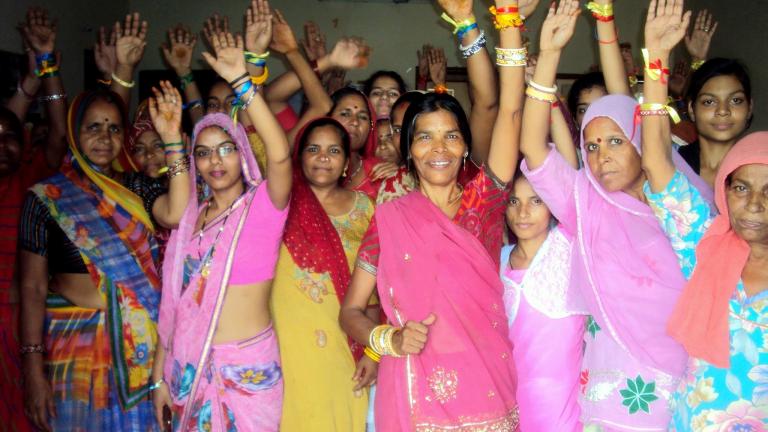
According to the Mahila House Trust (MHT), in anticipating, and helping minimize the impacts of climate change, incorporating finance is essential. “Absorbing Climate Impacts 2018” Climate CoLab winners Mahila Housing Trust (MHT) works with women living in poverty in South Asia. India and South Asia are particularly vulnerable to global warming, as climate issues such as flooding, heat waves, and clean water access impact local populations greatly. Through its projects in India, Bangladesh, and Nepal, MHT advocates for affected communities and develops pragmatic solutions in-line with cultural and regional aspects.
In South Asia, particularly India, there is a tradition of using “chit fund” which is a combination of credit and savings, where a small group of individuals come together for a pre-determined time period and contribute to a common pool at regular intervals. Every month, the collected money is loaned to the members through bidding. This helps those who are in need of funds but can only save small amount.
MHT team member Rajeswari Gorana explains that, “During a brainstorming we asked ourselves what do women from slums do to overcome emergency or contingency. We quickly contacted a few women leaders from a couple of slums in Ahmedabad (in the state of Gujarat, India). All of them said women came together and ran chit funds.” Through[h1] its previous projects in India, MHT noted this practice and realized there was potential to adapt chit-funds for climate resilience purposes. The chit-fund cumulative index-based micro insurance scheme developed by MHT proposes to cover loss and damage of the following: housing and community infrastructure, loss of food grain, identity papers (during floods), work days and health related expenses.
MHT also notes the importance of empowering and including women in the microfinance and climate adaptation process. In its chit-fund projects in India, MHT will collaborate with “vikasini”, who are female leaders from the community-based organizations to organize and manage the chit-fund cumulative insurance instrument, and act as advocates of resilience. An advisory board composed of healthcare, climate, and finance experts will be involved to develop the scheme; however, it will be implemented by vikasinis in frontline communities. Vikasini are trusted by their communities, and can also communicate their communities’ needs directly with MHT. Bijal Brahmbhatt, Director of MHT elaborates, “Being a socio-technical organization, MHT works for the last mile connectivity of services for the poor. The whole purpose is to make it a women-led or women-driven process because cities are unequal and it makes it worse for poor women.” MHT’s work addresses the intersectional nature of gender inequality and environmental justice, which made their Climate CoLab proposal a clear winner.
The team is excited by their Climate CoLab win, stating “MHT had the opportunity to share the success with partners, funders, academics, community members and we received a lot of appreciation for withstanding the competition and strengthening the idea. We now plan to approach the local governments, funders and academics to develop a financial strategy for absorbing loss and damage caused by climate change.”






